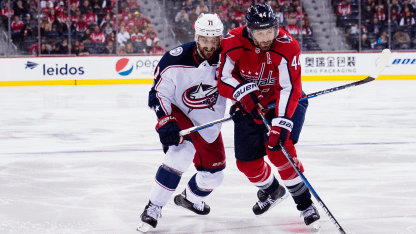Caps Face Jackets Again
Three nights after the Caps claimed a 3-2 win over the Jackets in Columbus on Nick Backstrom's late goal, the two teams tangle in D.C. on Friday

Three nights after they met in an entertaining hockey game in Columbus, the Caps and the Columbus Blue Jackets finish off a delayed home-and-home set on Friday in the District. It's the second of four sets of home-and-home games for the Caps this season, all of them coming against fellow denizens of the Metropolitan Division.
When the Caps and Jackets met on Tuesday in Columbus, they engaged in a close contest that appeared to be headed to overtime. But T.J. Oshie located an errant rebound of an Alex Ovechkin shot and, spotting Nicklas Backstrom out of the corner of his eye, he shoveled a perfect backhand feed to the silky center, who hammered home a one-timer with 42.9 seconds remaining in regulation. Backstrom's goal, the 200th of his NHL career, enabled the Caps to skate out of Ohio with a 3-2 victory.
Caps goalie Braden Holtby stopped 37 of 39 shots he faced in Tuesday's game, earning his 27th win of the season. The win ended a brief two-game slide for the Caps, putting them back on the winning track after they dropped two straight games in regulation for the first time since mid-November.
Backstrom's goal sent the Blue Jackets to their fourth straight setback (0-3-1), and their third straight in regulation. Given the Jackets' current slide, given the way Tuesday's game ended, given the tightness of the Metro Division standings and given that we're now less than two months from the conclusion of the 2017-18 NHL regular season, you can probably expect Columbus to be even pricklier than usual in Friday's rematch.
"Oh yeah, definitely," says Oshie. "An extremely tight game like that or a big blowout game tends to bring a little bit more emotion into the next game. So it's going to be a fun match. I always love when there is more emotion, more intensity and more physicality. It will be a good test for us."
Last month, the Caps faced the Carolina Hurricanes in a home-and-home set on back-to-back nights, losing 3-1 in Washington and authoring a comeback victory late in regulation in Raleigh a night later on a Jay Beagle goal with 1.3 seconds left.
The Caps have this home-and-home set with the Jackets this month, and they've got two of them next month. The Caps play a home-and-home set on back-to-back nights against the New York Islanders on March 15-16 and a home-and-home set with the New York Rangers on March 26-28.
Heading into Friday's slate of NHL activity, only a dozen points separates the eight teams in the Metro Division standings. Aside from the Rangers, who have informed their fan base that they'll be selling off assets between now and the NHL's Feb. 26 trade deadline, the Caps could end up facing any of the other teams in the Metro in the first or second round of the playoffs, assuming they remain in the postseason picture. That makes these home-and homes against divisional foes more entertaining for fans, more intense for players, and potentially more productive for coaching staffs.
"It's almost like a little bit of probing," says Caps coach Barry Trotz. "You're probing each other. You're going head-to-head, you're trying to get the wins, but you're also probing to see where you might be able to find some weakness or take advantage of everything from match-ups to things that are systematically evident in each other's game that we can adjust. To me, we get a lot of info or data on the other team, and they're going to do the same on us. Hopefully where we think that they were having some success, maybe we can turn that into an advantage for us."
Back in the 1980s, home-and-home sets were much more prevalent in what was then a 21-team league. The Capitals averaged 5.4 sets of home-and-home games per season during the 1980s, and they had as many as nine of them in a season (1981-82).
"When you play a time in a back-to-back or a home-and-home situation," says Oshie, "just with the competitiveness of NHL players, it automatically brings out that playoff mentality. Whatever nastiness that happened with the game before - or a hit here or a fight there - there is not enough time to forget about it from the opponent, or for you to forget about something they did. And those emotions just carry right into that next game.
"I think that's the only difference between something happening against a certain team and then not playing them for a month. When you play them in a couple of days' span, those emotions stick with you for a couple of days and you have to choice but to bring them over, and I think that's where that playoff mentality comes out."
Despite its four-game slide, Columbus remains in the second wild card spot in the Eastern Conference playoffs with 58 points, nine fewer than the first-place Capitals. The New York Islanders also have 58 points, but the Jackets have played two fewer games, so they're in tenuous control of that final playoff berth for the time being.
The Jackets' average of just 2.51 goals per game puts them last in the Metro and 29th in the league in that department. Columbus ranks 11th in the NHL with 2.75 goals against per game, and the Jackets are next-to-last in the league with a mediocre special teams index of 89.3.
For the Jackets, Friday's game starts off a set of back-to-back games as well. Columbus will continue north to Newark after Friday's game in Washington, as the Jackets have a Saturday night date with the Devils. Columbus is in the midst of a stretch of five straight - and nine of 10 - games against Metro opponents.


















